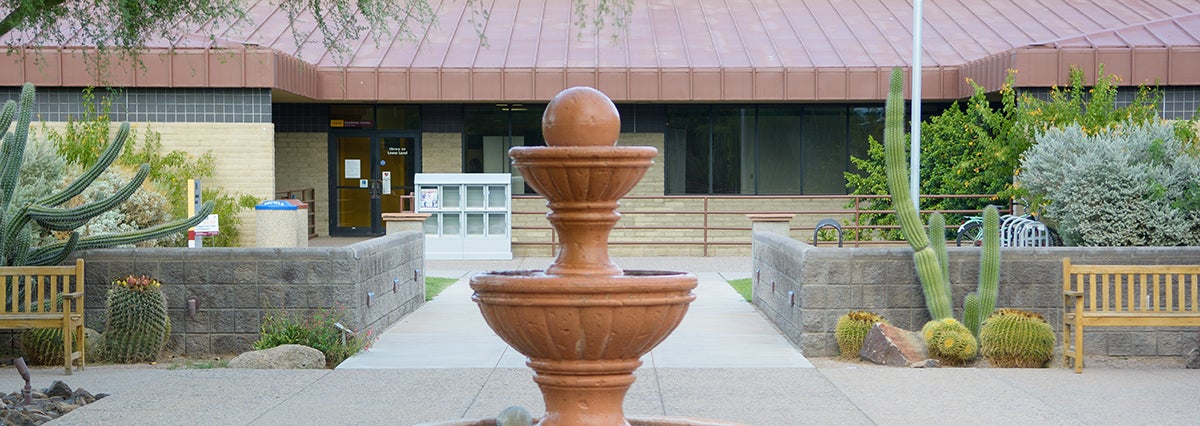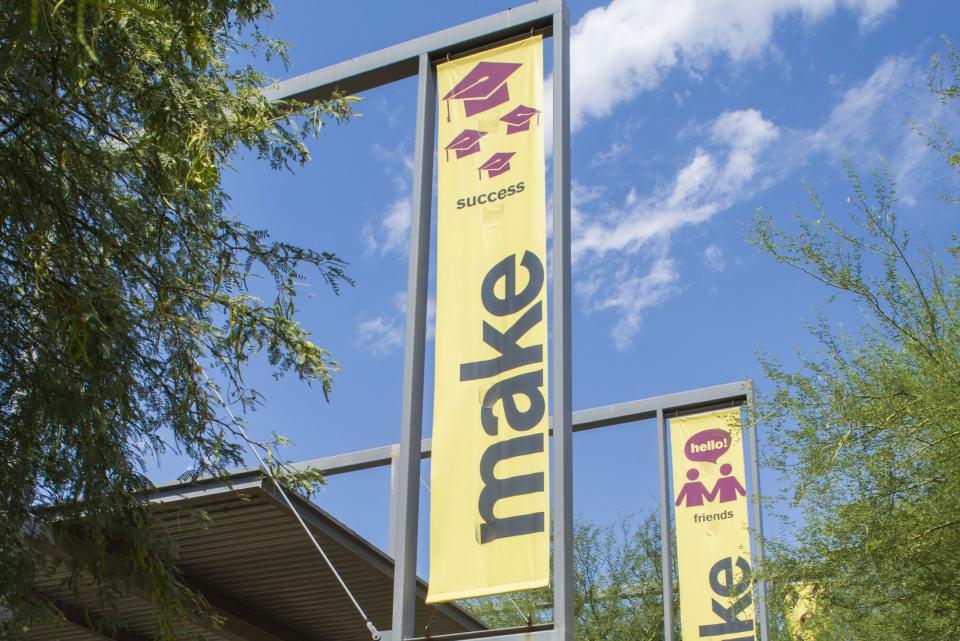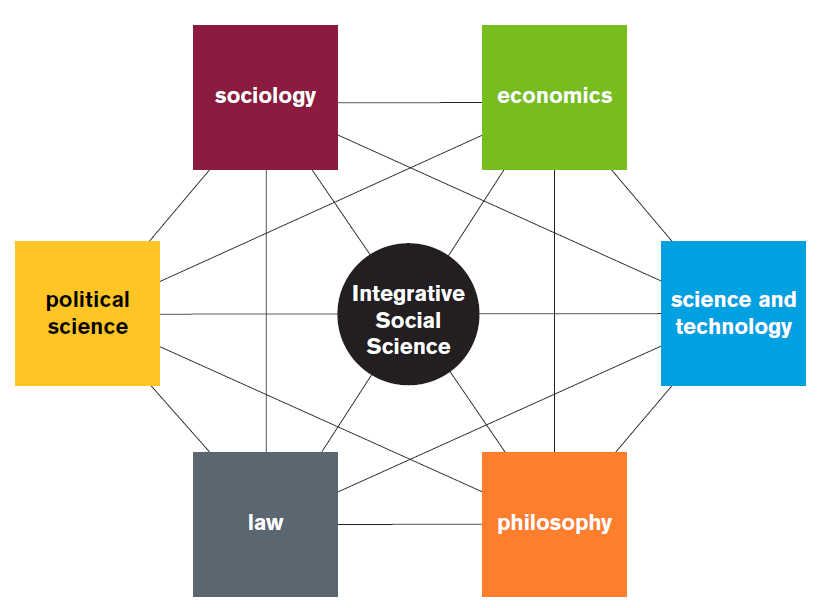
MS in Integrative Social Science
Breaking down knowledge boundaries to

Integrative Social Science connects knowledge

The MS degree in Integrative Social Science is intended for forward-looking students who wish to make a positive impact on society. The integrative approach emphasizes both theoretical analysis and real-world problem-solving abilities. The degree puts you in an excellent position to pursue either doctoral work in the social sciences or a professional career in fields that seek to improve the lives of everyday people.
This master's program can also be completed in an accelerated timeframe, in the combination 4 + 1 combined BS/MS program. By sharing 12 credits across the two degrees, you save a year of course work (and money!).
The program explodes traditional intellectual boundaries to immerse you in the theories and skill sets relevant to success in many fields. You’ll cultivate an approach to social analysis that might otherwise escape students in traditional, silo-centric social science programs.
You will …
- experience a true fusion of academic fields, connecting important questions in economics, political science, sociology, science and technology studies, philosophy, law.
- enjoy courses and assignments team-taught and evaluated by faculty experts from across disciplines.
- study the world’s societal agents and systems as pieces of an interconnected whole, including:
- the interactions between social, economic and political systems;
- relations between nation-states;
- the globalization of governance;
- socio-economic and socio-political attitudes;
- social effects of science and technology;
- epistemic societies.
- be able to distinguish enduring social problems from temporary conditions, personal assumptions from conclusions drawn upon empirical evidence and critical analyses of human interaction.
You’ll draw from the best of disciplines across the social sciences to contribute as a leader, teacher, and changemaker in a technically sophisticated, interconnected world.
Gain marketable skills, versatility
Whether you are seeking a pathway to doctoral study or are a professional looking for advanced training in the social sciences, your training in the master’s in integrative social science offers a solid foundation for work in a variety of areas, including:
- Research analysis
- Public administration
- Policy analysis
- Sustainability
- Business and environmental affairs
- Organizational management
- Community college teaching
The master’s in integrative social science also provides excellent preparation for doctoral programs in the social sciences or humanities.
You’ll graduate with skills desired in many professional fields
- Creative problem-solving abilities
- The capacity to work effectively in both team-centered and self-directed contexts
- Advanced analytical knowledge of complex social and global issues
- Research experience
- Professional writing and communication skills
The Curriculum
Your core courses (12 credit hours) are team-taught by experts in political science, sociology, economics and philosophy
ISS 501 Advanced Integrated Social Research Methods
ISS 502 Advanced Seminar in Integrated Social Science
ISS 504 Advanced Integrated Theories of Social Science
ISS 505 Multivariate Methodologies of Social Science
You choose electives (12 credit hours) from these courses or others approved by your advisor
ISS 506 Community Governance, Leadership, and Civic Engagement
ISS 508 Knowledge, Innovation, and Social Change
ISS 510 Religion, Secularism, and Social Dynamics
ISS 512 Advanced Integrative Ethics in Social Science
ISS 514 Cultural Diversity and Gender Understanding
ISS 516 Conflict Resolution, Peace Studies, and Social Movements
ISS 518 Science, Technology, and Social Systems
ISS 522 Globalization and International Political Economy
ISS 562 Politics of Development and Underdevelopment
You decide on the culminating experience best for you (6 hours)
Option 1: ISS 599 Thesis (6 credits)
Recommended for those who may go on to a doctoral program.
Option 2: ISS 593 Applied Project and ISS 584 Internship (3 credits each)
Recommended for those looking to advance in their professional field.

Who can apply?
We welcome applicants who have earned a bachelor’s degree in any of the social sciences or a related field, or who want to pursue a second master’s degree.
Academic transcripts are required (and evidence of English proficiency for international students).
You may apply to start the program in the fall semester.
Current undergraduate ASU students majoring in any of the three social science majors at ASU Polytechnic campus (social science, political science, and science, technology and society) are encouraged to consider the 4+1 accelerated BS/MS combination program. You may apply during your junior year.
The essence of our approach? Integration leads to optimization
You will train to understand the strengths and shortcomings of different social science disciplines as tools for achieving solutions and change — and learn to combine them skillfully to achieve the best possible results.
Consider these local, national and global scenarios:
Overuse of a community pool
Economists might propose a fee for use and determine the elasticity price that would change behavior. Sociologists might socialize community members on responsible use. Political scientists might opt for regulations to limit use. Carefully crafted policies, incentives or disincentives that draw on all these disciplines are more likely to please pool users.
Economic recession
A typical analysis might look to idealized economic theory to identify the cause. Potential policy solutions might lean too heavily on historical, sociological, political or economic thought. Failing to view the causes and effects of recession as broadly social rather than narrowly economic phenomena is likely to lead policymakers and the public astray.
Technology transfer success
Why do new technologies exported to another part of the world sometimes fail to be adopted? Successful technology transfer requires the right blend of cultural, economic, political, and geographical circumstances. What might seem promising from an anthropological, sociological, economic, or political-scientific perspective may seem ill-advised from the broader perspective of integrative social science.
Learn More
For more information on joining this innovative master’s degree at ASU’s Polytechnic campus, contact:
Scott Scheall, PhD
Interim Graduate Studies Director
Social Science
[email protected]
Nicholas Alozie, PhD
Faculty Head
Social Science
[email protected]
ASU College of Integrative Sciences and Arts
480-727-1395
Santa Catalina Hall
7271 E Sonoran Arroyo Mall
Mesa, AZ 85212-2780